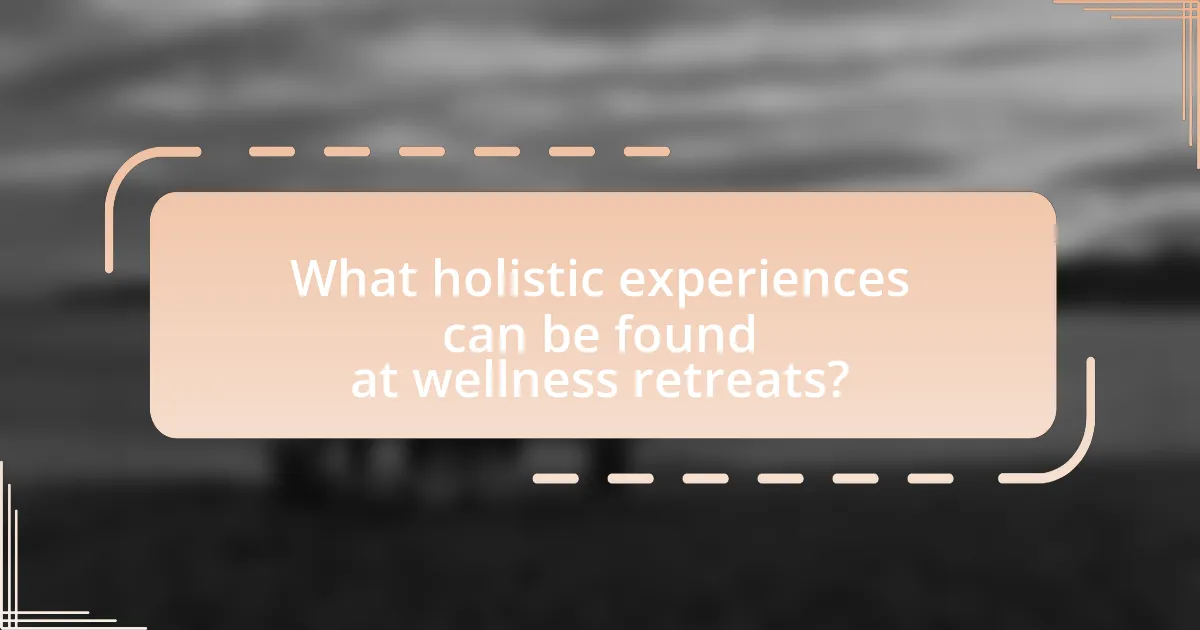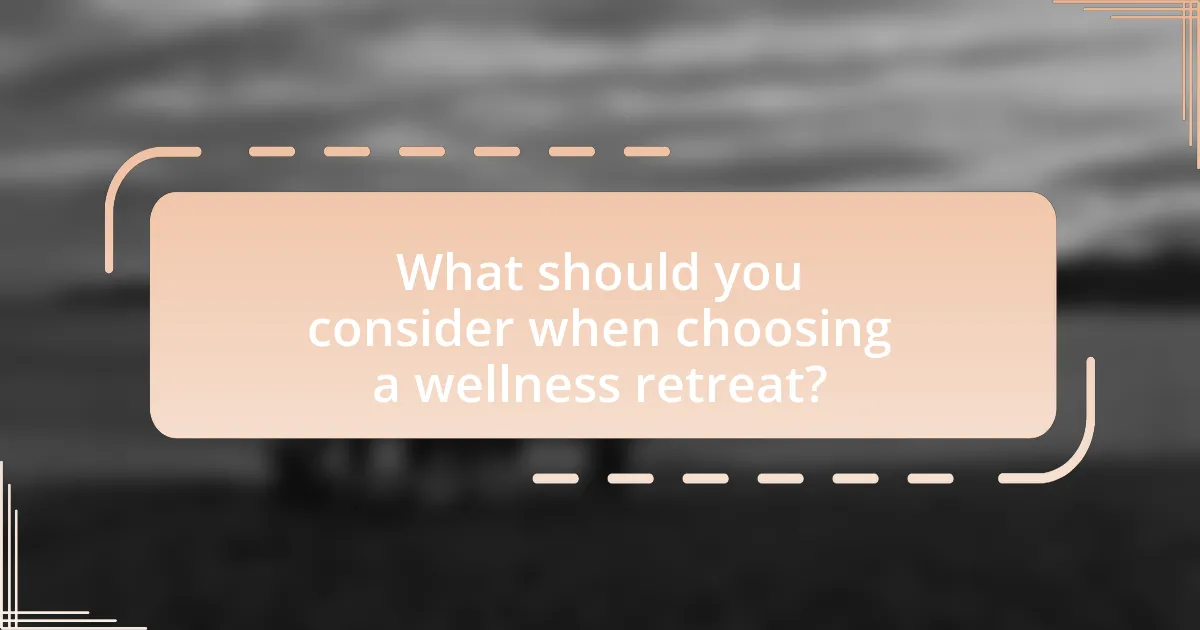Wellness retreats and boutique hotels are specialized accommodations that prioritize holistic health and well-being through tailored programs and unique experiences. Wellness retreats focus on activities such as yoga, meditation, and nutrition workshops, while boutique hotels offer personalized services and environments that enhance relaxation. The growing popularity of wellness tourism, valued at approximately $639 billion in 2020, reflects a societal shift towards prioritizing mental and physical health. This article explores the differences between wellness retreats and traditional hotels, the unique services offered, and the factors influencing the selection of a wellness retreat, providing insights into how these establishments cater to modern lifestyle needs and promote overall well-being.

What are Wellness Retreats and Boutique Hotels?
Wellness retreats are specialized facilities that focus on holistic health and well-being, offering programs that include activities such as yoga, meditation, and nutrition workshops. Boutique hotels, on the other hand, are small, stylish accommodations that provide personalized services and unique experiences, often emphasizing local culture and design. Together, wellness retreats and boutique hotels create environments that promote relaxation and rejuvenation, catering to guests seeking a comprehensive approach to health and leisure. This combination is increasingly popular, as evidenced by the growth of the wellness tourism market, which was valued at approximately $639 billion in 2020 and is projected to continue expanding.
How do wellness retreats differ from traditional hotels?
Wellness retreats differ from traditional hotels primarily in their focus on holistic health and well-being. While traditional hotels prioritize accommodation and basic amenities, wellness retreats offer specialized programs that include activities such as yoga, meditation, nutrition workshops, and spa treatments designed to promote physical and mental health. According to a report by the Global Wellness Institute, the wellness tourism market was valued at $639 billion in 2017, highlighting the growing demand for experiences that prioritize well-being over conventional hospitality services.
What unique services do wellness retreats offer?
Wellness retreats offer unique services such as personalized wellness programs, holistic therapies, and immersive experiences focused on mental and physical well-being. These retreats often provide tailored fitness classes, nutritional workshops, and mindfulness practices like yoga and meditation, designed to cater to individual health goals. For instance, a study published in the Journal of Alternative and Complementary Medicine highlights that participants in wellness retreats report significant improvements in stress reduction and overall health, demonstrating the effectiveness of these specialized services.
How do boutique hotels enhance the wellness experience?
Boutique hotels enhance the wellness experience by providing personalized services, unique environments, and holistic amenities tailored to individual needs. These hotels often feature wellness-focused facilities such as spas, yoga studios, and organic dining options, which contribute to a comprehensive approach to health and relaxation. For instance, a study by the Global Wellness Institute indicates that wellness tourism is a rapidly growing sector, with travelers increasingly seeking accommodations that prioritize well-being. This trend underscores the effectiveness of boutique hotels in creating immersive wellness experiences that cater to the desires of health-conscious guests.
Why are wellness retreats gaining popularity?
Wellness retreats are gaining popularity due to the increasing global focus on mental and physical health. As stress levels rise in modern society, individuals seek environments that promote relaxation, mindfulness, and holistic healing. According to a report by the Global Wellness Institute, the wellness tourism market was valued at $639 billion in 2017 and is projected to grow significantly, indicating a strong consumer demand for wellness-focused experiences. This trend is further supported by the rise of social media, where wellness influencers promote the benefits of retreats, making them more accessible and appealing to a broader audience.
What societal trends contribute to the rise of wellness retreats?
The rise of wellness retreats is primarily driven by increasing societal awareness of mental health and holistic well-being. As stress levels rise due to fast-paced lifestyles, individuals seek refuge in wellness retreats that offer relaxation and rejuvenation. The World Health Organization reported a significant increase in mental health issues, highlighting the need for effective stress management solutions. Additionally, the growing trend of mindfulness and self-care, fueled by social media and wellness influencers, has led to a surge in demand for retreats that provide immersive experiences focused on physical, emotional, and spiritual health. This societal shift towards prioritizing well-being is evident in the increasing number of wellness tourism participants, which reached 830 million in 2017, according to the Global Wellness Institute.
How do wellness retreats cater to modern lifestyle needs?
Wellness retreats cater to modern lifestyle needs by providing tailored experiences that address stress, health, and well-being in a holistic manner. These retreats often offer a combination of fitness programs, mindfulness practices, nutritious meals, and spa treatments, all designed to promote physical and mental health. For instance, a study published in the Journal of Alternative and Complementary Medicine found that participants in wellness retreats reported significant reductions in stress and improvements in overall well-being after just a few days of immersive activities. This evidence supports the effectiveness of wellness retreats in meeting the demands of contemporary life, where individuals seek balance and rejuvenation amidst busy schedules.

What holistic experiences can be found at wellness retreats?
Wellness retreats offer a variety of holistic experiences designed to promote physical, mental, and spiritual well-being. These experiences typically include yoga and meditation sessions, which enhance mindfulness and relaxation, as well as nutritional workshops that educate participants on healthy eating habits. Additionally, many retreats provide spa treatments such as massages and aromatherapy, which help alleviate stress and improve overall health. Evidence from studies indicates that engaging in these activities can lead to reduced anxiety and improved emotional resilience, supporting the effectiveness of holistic approaches in wellness settings.
What types of wellness programs are typically offered?
Wellness retreats typically offer a variety of programs designed to enhance physical, mental, and emotional well-being. Common types of wellness programs include yoga and meditation sessions, nutritional workshops, fitness classes, spa treatments, and holistic therapies such as acupuncture and aromatherapy. These programs are structured to promote relaxation, stress reduction, and overall health improvement, often incorporating elements of mindfulness and personal development. Research indicates that participation in such wellness programs can lead to significant improvements in mental health and physical fitness, as evidenced by studies showing reduced stress levels and enhanced life satisfaction among participants.
How do yoga and meditation play a role in wellness retreats?
Yoga and meditation are central components of wellness retreats, as they promote physical, mental, and emotional well-being. These practices facilitate relaxation, reduce stress, and enhance mindfulness, which are essential for participants seeking holistic healing. Research indicates that yoga can improve flexibility, strength, and balance, while meditation has been shown to decrease anxiety and improve focus. A study published in the Journal of Alternative and Complementary Medicine found that participants in yoga and meditation programs reported significant improvements in overall wellness and quality of life. Thus, the integration of yoga and meditation in wellness retreats effectively supports the retreat’s goal of fostering comprehensive health and rejuvenation.
What nutritional offerings are common in wellness retreats?
Wellness retreats commonly offer plant-based meals, organic ingredients, and nutrient-dense foods. These retreats emphasize whole foods, often including fresh fruits, vegetables, whole grains, nuts, and seeds, which are known to promote health and well-being. Many wellness retreats also provide specialized dietary options, such as gluten-free, vegan, or raw food diets, catering to individual health needs and preferences. Research indicates that diets rich in whole foods can improve overall health, reduce inflammation, and enhance mental clarity, making these offerings particularly beneficial for retreat participants.
How do wellness retreats promote mental and physical health?
Wellness retreats promote mental and physical health by providing immersive environments that encourage relaxation, mindfulness, and holistic practices. These retreats often include activities such as yoga, meditation, and nutrition workshops, which have been shown to reduce stress and improve overall well-being. Research indicates that mindfulness practices can lower cortisol levels, leading to decreased anxiety and improved mood. Additionally, physical activities offered at these retreats, such as hiking or fitness classes, contribute to enhanced physical fitness and cardiovascular health. Studies have demonstrated that regular participation in such activities can lead to long-term health benefits, including lower rates of chronic diseases and improved mental clarity.
What therapies are available to support mental well-being?
Therapies available to support mental well-being include cognitive behavioral therapy (CBT), mindfulness-based stress reduction (MBSR), and art therapy. Cognitive behavioral therapy is effective in treating anxiety and depression by changing negative thought patterns. Mindfulness-based stress reduction helps individuals manage stress through meditation and awareness techniques. Art therapy utilizes creative expression to improve emotional well-being and facilitate healing. These therapies are supported by research indicating their efficacy in enhancing mental health outcomes. For instance, a meta-analysis published in the Journal of Consulting and Clinical Psychology found that CBT significantly reduces symptoms of anxiety and depression in various populations.
How do physical activities contribute to overall wellness?
Physical activities significantly contribute to overall wellness by enhancing physical health, mental well-being, and emotional stability. Engaging in regular exercise improves cardiovascular health, strengthens muscles, and boosts the immune system, which collectively reduces the risk of chronic diseases. According to the World Health Organization, adults should engage in at least 150 minutes of moderate-intensity aerobic activity each week to achieve these health benefits. Additionally, physical activities release endorphins, which are natural mood lifters, thereby alleviating symptoms of anxiety and depression. Research published in the Journal of Clinical Psychiatry indicates that exercise can be as effective as medication for some individuals with depression. Thus, the integration of physical activities into daily routines is essential for achieving comprehensive wellness.

What should you consider when choosing a wellness retreat?
When choosing a wellness retreat, consider the retreat’s focus and offerings, such as yoga, meditation, nutrition, or spa treatments. Different retreats specialize in various aspects of wellness, so aligning your personal goals with the retreat’s focus is crucial for a fulfilling experience. Additionally, evaluate the location and environment, as natural settings can enhance relaxation and rejuvenation. Research the qualifications and experience of the staff, as knowledgeable professionals can significantly impact the quality of your retreat. Lastly, consider the retreat’s reviews and testimonials, which provide insights into the experiences of past participants and can guide your decision-making process.
What factors influence the selection of a wellness retreat?
The selection of a wellness retreat is influenced by several key factors, including location, type of wellness programs offered, cost, and the reputation of the retreat. Location plays a crucial role as individuals often seek serene environments that promote relaxation and healing, such as coastal areas or mountainous regions. The type of wellness programs, which may include yoga, meditation, nutrition workshops, or spa treatments, directly impacts the appeal of the retreat to potential attendees. Cost is another significant factor, as individuals must consider their budget when selecting a retreat, with prices varying widely based on amenities and services provided. Finally, the reputation of the retreat, often assessed through reviews and testimonials, can greatly influence decision-making, as individuals tend to prefer retreats with proven track records of positive experiences.
How important is location in choosing a wellness retreat?
Location is critically important in choosing a wellness retreat. The setting significantly influences the overall experience, as it can enhance relaxation, provide access to nature, and create a tranquil atmosphere conducive to healing. For instance, retreats located in serene environments, such as mountains or near the ocean, often offer activities like hiking or beach meditation, which can improve mental well-being. Research indicates that natural surroundings can reduce stress and promote mindfulness, making location a key factor in the effectiveness of wellness programs.
What should you look for in terms of amenities and services?
When considering amenities and services at wellness retreats, prioritize features that enhance relaxation and holistic well-being. Look for on-site spa facilities offering a range of treatments such as massages, facials, and holistic therapies, which are essential for stress relief and rejuvenation. Additionally, check for fitness options like yoga classes, meditation sessions, and personal training, as these activities promote physical health and mental clarity.
Healthy dining options are also crucial; retreats should provide nutritious meals made from organic, locally sourced ingredients to support overall wellness. Furthermore, inquire about additional services such as wellness consultations, workshops on mindfulness, and nature-based activities, which can enrich the retreat experience.
Research indicates that retreats with comprehensive wellness programs, including these amenities, significantly contribute to participants’ mental and physical health improvements, as highlighted in studies published in the Journal of Alternative and Complementary Medicine.
How can you maximize your experience at a wellness retreat?
To maximize your experience at a wellness retreat, actively engage in all offered activities and prioritize self-care. Participating in yoga, meditation, and workshops enhances physical and mental well-being, fostering a deeper connection to the retreat’s holistic approach. Research indicates that immersive experiences in wellness settings can significantly reduce stress and improve overall health (Kabat-Zinn, J. et al., 2016, “Mindfulness-Based Stress Reduction”). Additionally, setting personal intentions before arrival can help focus your experience, ensuring that you gain the most from the retreat’s offerings.
What preparation is necessary before attending a wellness retreat?
Before attending a wellness retreat, individuals should engage in thorough research about the retreat’s offerings, schedule, and location. This preparation ensures alignment with personal wellness goals and expectations. Additionally, participants should consider packing appropriate clothing and personal items, such as yoga gear or meditation tools, to enhance their experience. It is also advisable to consult with a healthcare professional if there are any pre-existing health conditions that may affect participation in activities. This preparation is crucial for maximizing the benefits of the retreat and ensuring a safe and enjoyable experience.
How can you set personal goals for your wellness retreat experience?
To set personal goals for your wellness retreat experience, first identify specific areas of wellness you wish to improve, such as physical health, mental clarity, or emotional balance. Next, create measurable and achievable objectives, like practicing yoga daily, meditating for 15 minutes, or journaling each evening. Research indicates that setting SMART goals—Specific, Measurable, Achievable, Relevant, and Time-bound—enhances the likelihood of success in personal development (Doran, 1981). By clearly defining your intentions and tracking your progress, you can maximize the benefits of your wellness retreat.
What are the best practices for a successful wellness retreat experience?
The best practices for a successful wellness retreat experience include thorough planning, setting clear intentions, and engaging in diverse activities that promote holistic well-being. Thorough planning ensures that participants have a structured schedule that balances relaxation and activities, which is essential for maximizing benefits. Setting clear intentions allows individuals to focus on personal goals, whether they are seeking stress relief, physical rejuvenation, or spiritual growth. Engaging in diverse activities, such as yoga, meditation, nutrition workshops, and nature excursions, caters to various aspects of wellness, enhancing the overall experience. Research indicates that retreats that incorporate a variety of wellness practices lead to greater participant satisfaction and improved mental health outcomes.